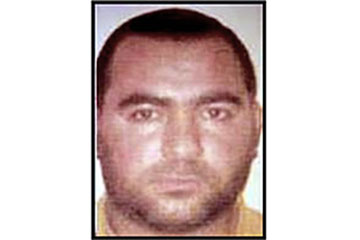
(2 of 3)
Baghdadi has a large pool from which to recruit. Syria has drawn as many foreign fighters to its battlefields in two and a half years as Afghanistan did in two and a half decades of war, according to senior officials in the Obama Administration. Most of the new arrivals swear allegiance to Baghdadi and join ISIS, say U.S. and Middle Eastern terrorism analysts. ISIS's well-equipped soldiers, heavy weaponry and sophisticated attacks are evidence of robust funding streams.
And Baghdadi doesn't just fight: he holds terrain. ISIS has taken over the Syrian city of Raqqa and its environs, where an influx of citizens fleeing the war has swelled the population to 1 million, making it the largest municipality ever administered by al-Qaeda. ISIS controls border crossings to Turkey, a crucial NATO member and U.S. ally, and has captured oil fields and refineries, which help it generate income locally. It even runs a bus service from Raqqa to the surrounding villages.
There's a similar picture in parts of Iraq. ISIS is so strong in the northern Iraqi city of Mosul, whose population is nearly 2 million, that Baghdadi's operatives collect "taxes" unmolested. The group is now taking control of areas in neighboring Anbar province, its former Iraq stronghold, say Iraqi officials.
Baghdadi's on-the-ground power base has given him unprecedented authority for an al-Qaeda figure who is not part of bin Laden's original group, the survivors of which are now mostly based in Pakistan. Ayman al-Zawahiri, bin Laden's designated successor, still wields influence in the organization, but his ability to direct operations is compromised by having to live in hiding. As a consequence, affiliates like al-Qaeda in the Islamic Maghreb (AQIM), Somalia's al-Shabab and Yemen's al-Qaeda in the Arabian Peninsula (AQAP) are rising in prominence and vying for leadership roles. But it is ISIS that has the biggest stage, and Baghdadi the biggest clout.
For the moment, Baghdadi has not yet turned his attention to the West in the way that Yemen's AQAP has, with its technologically sophisticated plots to blow up passenger planes and plans to attack foreign embassies. But if he is allowed to continue unchecked, or if the Syrian civil war continues to serve as a spawning ground for a new generation of jihadists, it may be only a matter of time. U.S. Congressman Mike Rogers, chairman of the House Intelligence Committee, says al-Qaeda's affiliates in Syria are already debating about when to launch an attack on the West. "They're talking about conducting external operations, which is exactly what happened in Afghanistan, which led to 9/11," Rogers warned in an address to policymakers at the 2013 Foreign Policy Initiative Forum in Washington in October. "The only thing we think is stopping it now is the fact that there is this struggle between al-Qaeda core leadership saying, 'Hold off, don't do it yet.'" U.S. National Counterterrorism Center director Matthew G. Olsen told the Senate Homeland Security Committee on Nov. 14 that ISIS's "growing cadre of Western recruits probably bolsters the group's pool of external operatives who could be used to target the West."
An Elusive Enemy
jihadist websites are full of accounts of Baghdadi's battlefield exploits, but surprisingly little is known about the man himself. Born Ibrahim bin 'Awad bin Ibrahim al-Badri ar-Radawi al-Husseini as-Samara'i in 1971 to a religious family in Samarra, Iraq, he claims he can trace his lineage all the way back to the Prophet Muhammad. Abu Bakr al-Baghdadi is a nom de guerre; he also goes by the name Abu Du'a. He has a Ph.D. in Islamic studies from the Islamic University of Baghdad.
When the U.S. and its allies invaded Iraq in 2003, Baghdadi joined forces with his mentor Abu Mousab al-Zarqawi, a Jordanian militant who went on to found al-Qaeda in Iraq (AQI). Over the years, Baghdadi climbed the ranks, taking AQI's leadership position in 2010. (Zarqawi was killed in 2006, his successor Abu Ayub al-Masri died in 2010, and a subsequent leader died shortly thereafter.)
Abdul Rahman Hamad, an ISIS fighter from Homs, Syria, who is currently recovering from injuries in a safe house in Tripoli, Lebanon, remembers meeting Baghdadi at a training camp in Diyala province in eastern Iraq in 2004, when he and hundreds of other Syrian jihadists flooded into Iraq to combat the Americans. Baghdadi seldom spoke, Hamad tells TIME, but when he did, "he had a calm and convincing voice," even in the middle of an air strike. As a commander, Baghdadi stood out for his focus on his men's safety, planning not only sophisticated attacks but also secure retreats. Baghdadi wanted to keep himself alive too, says Hamad. Early on in the war, Baghdadi started disguising himself, wrapping a scarf around his face even in the presence of close associates. "Abu Bakr knew how men can be seduced by money, so he never shared his secrets with anyone," says Hamad.
Even his enemies bear him grudging respect for that elusiveness. Members of Hizballah, the Lebanese Shi'ite militia that is fighting on behalf of Assad, call him "the Ghost." "Only a few people know the face of Baghdadi," says Sheik Ahmad, the Hizballah intelligence official in charge of investigating ISIS's fighters in Syria. For example, he says, "You could be sitting with him one day, and when he passes next to you the second day you will not recognize him." Ahmad, who spoke on condition of not revealing his full name, says his archenemy can slip effortlessly into convincing regional accents, from Lebanese to Syrian to Saudi Arabic, a trait that befuddles his pursuers even as it endears him to his men. He has a habit of showing up unexpectedly on the front lines to boost troop morale.
